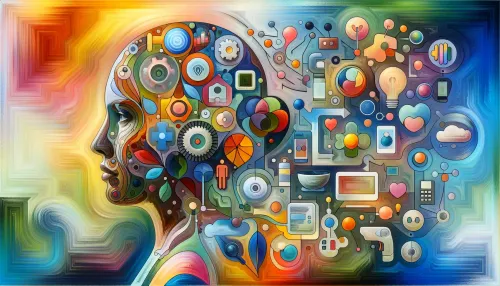Disruptive Technologies: Revolutionizing Mental Health Management and Well-Being

In today's fast-paced world, the intersection of technology and mental health is transforming the way we perceive, access, and manage mental wellness. From AI-powered mental health support to virtual reality therapy, these disruptive technologies are reshaping the landscape of mental health care like never before. Let's delve into the innovative advancements that are revolutionizing mental health management and enhancing well-being.
AI-Powered Mental Health Support: Enhancing Accessibility
Artificial intelligence (AI) has emerged as a game-changer in the field of mental health support. Through chatbots, machine learning algorithms, and natural language processing, AI platforms can provide immediate, round-the-clock emotional support, empowering individuals to access therapy resources conveniently. By leveraging AI, individuals can receive personalized coping mechanisms, self-care practices, and symptom management strategies tailored to their specific mental health needs. The seamless integration of AI into mental health support systems not only enhances accessibility but also reduces the stigma associated with seeking professional help.
Virtual reality (VR) therapy presents an immersive and effective approach to addressing mental health challenges. By simulating environments that elicit relaxation or expose individuals to trigger situations in a controlled setting, VR therapy offers a novel way to treat anxiety disorders, phobias, PTSD, and other mental health conditions. With its ability to create realistic sensory experiences, VR therapy provides a safe space for individuals to confront and manage their fears, thereby promoting desensitization and emotional regulation.
The Impact of Virtual Reality Therapy on Mental Wellness
Data analytics plays a pivotal role in proactive mental health care by providing actionable insights into individuals' well-being patterns. Through continuous monitoring of behavioral and physiological data, such as sleep patterns, heart rate variability, and activity levels, data analytics empowers mental health professionals to identify early warning signs of distress or deterioration in mental wellness. This proactive approach enables interventions to be tailored to individual needs, preventing crises before they escalate.
Related Article: Harnessing Wearable Health Tech: Personalized Monitoring for Well-Being Optimization
Harnessing Data Analytics for Proactive Mental Health Care
Mobile apps designed for emotional regulation and stress relief have become indispensable tools for maintaining mental well-being amidst life's demands. These apps offer various features, including guided meditation sessions, breathing exercises, mood tracking, and journaling prompts. By incorporating elements of cognitive-behavioral therapy and mindfulness practices, these apps equip users with practical techniques to reduce stress, manage anxiety, and cultivate emotional resilience in their daily lives.
In an increasingly digital world, crisis intervention services have transitioned to remote platforms to provide immediate support during moments of acute psychological distress. Online crisis hotlines, text-based support services, and video conferencing platforms enable individuals in crisis to connect with trained mental health professionals from the comfort and privacy of their own surroundings. By embracing digital channels for crisis intervention, these services ensure that timely assistance is accessible to those in need regardless of geographical constraints.
Mobile Apps for Emotional Regulation and Stress Relief
Mindfulness apps have gained widespread popularity for their role in promoting stress reduction and emotional balance. These apps offer guided mindfulness practices, mindful breathing exercises, body scans, and meditative activities that cultivate present-moment awareness and emotional equilibrium. By incorporating mindfulness into daily routines through user-friendly interfaces and tailored content, these apps empower individuals to navigate life's challenges with resilience and inner calm.
Related Article: Technological Revolution in Healthcare: Exploring AI-Powered Innovations Transforming Wellness Practices
Crisis Intervention: Remote Mental Health Support Today
Teletherapy has emerged as a vital bridge for overcoming barriers in accessing traditional mental health services. Through secure video conferencing platforms and online communication tools, individuals can engage in therapy sessions with licensed professionals regardless of geographical location or mobility constraints. Teletherapy not only expands the reach of mental health care but also addresses disparities in service availability, making therapeutic interventions more inclusive and accessible.
As disruptive technologies continue to evolve and intersect with mental health care, they hold immense promise in shaping a future where proactive well-being practices are seamlessly integrated into our daily lives. By harnessing the power of AI-driven support systems, immersive therapies, data-informed interventions, and mobile app accessibility, we are moving towards a future where mental health management is personalized, inclusive, and deeply interconnected with our digital experiences.
Integrating Mindfulness Apps for Emotional Balance
Peppino Blog embraces these advancements at the forefront of innovation with a commitment to providing insightful perspectives on technology's transformative impact on mental wellness. Stay tuned as we navigate the ever-evolving landscape of wellness technologies to empower our readers with knowledge that enhances their holistic well-being.
Frequently Asked Questions
AI-powered mental health support utilizes chatbots and machine learning to provide immediate emotional assistance. These platforms offer personalized coping strategies, self-care practices, and symptom management tailored to individual needs, enhancing accessibility and reducing stigma around seeking help.
Virtual reality therapy immerses individuals in controlled environments to address mental health challenges. By simulating scenarios that trigger anxiety or stress, it allows users to confront fears safely, promoting desensitization and emotional regulation for conditions like PTSD and phobias.
Mobile apps for emotional regulation provide tools for stress relief through features like guided meditations, mood tracking, and journaling prompts. By incorporating cognitive-behavioral techniques and mindfulness practices, these apps help users manage anxiety and cultivate emotional resilience in daily life.
Check Out These Related Articles

Smart Home Health Integration: IoT Devices Redefining Daily Wellness Routines

The Rise of Crowdsourced Wellness Apps: A Collaborative Approach to Healthier Living

The Digital Infusion: How Technology Connects Global Wellness Communities
